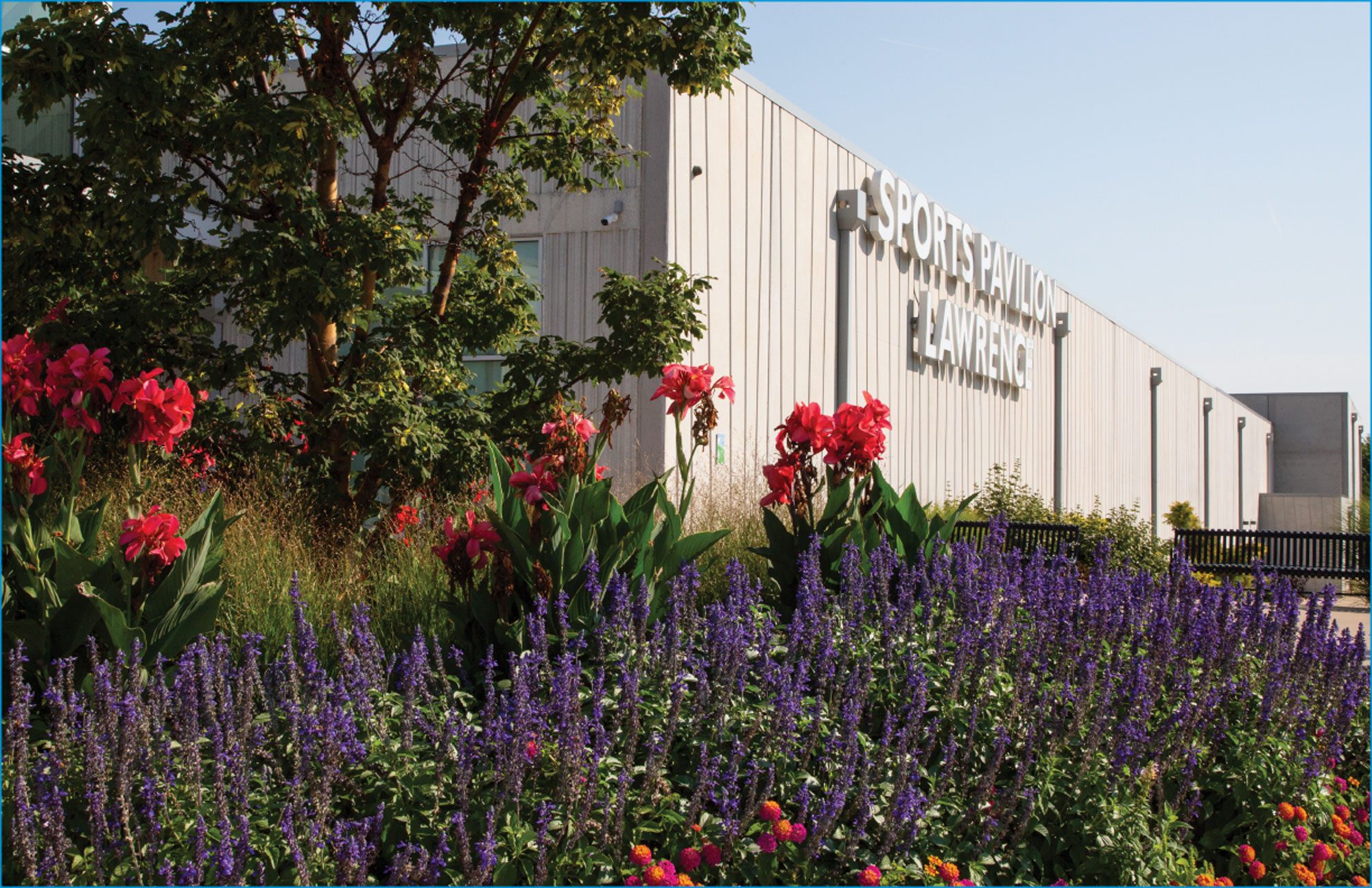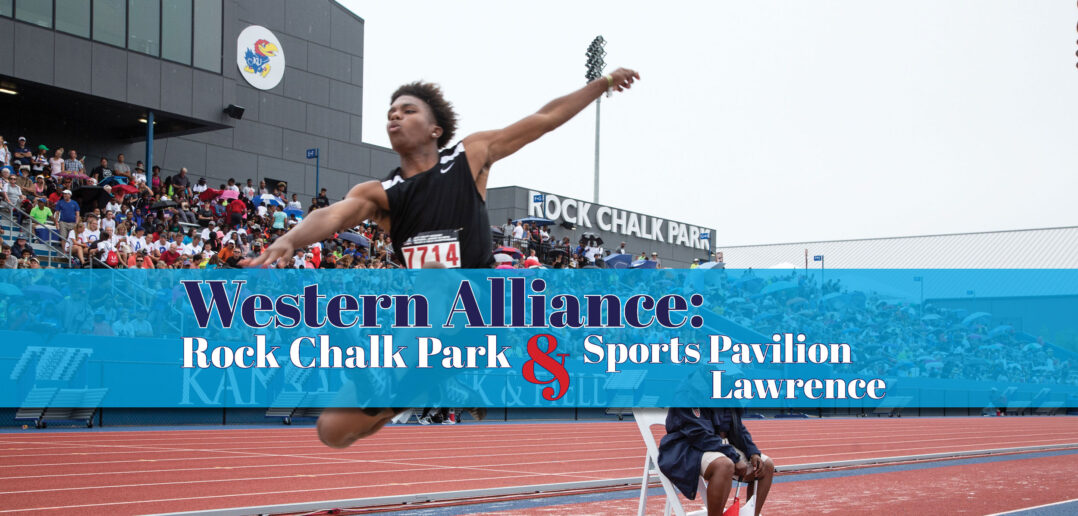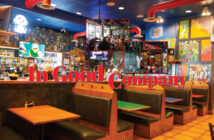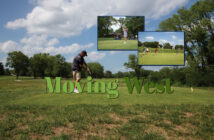| story by | |
| photos by | Steven Hertzog and courtesy of KU Athletics |
| OPEN A PDF OF THE ARTICLE |
In the eight years since it opened, Rock Chalk Park has delivered on its promise to maintain a comfortable community space where people can congregate and work out, as well as attract outside sporting events to boost the economy.
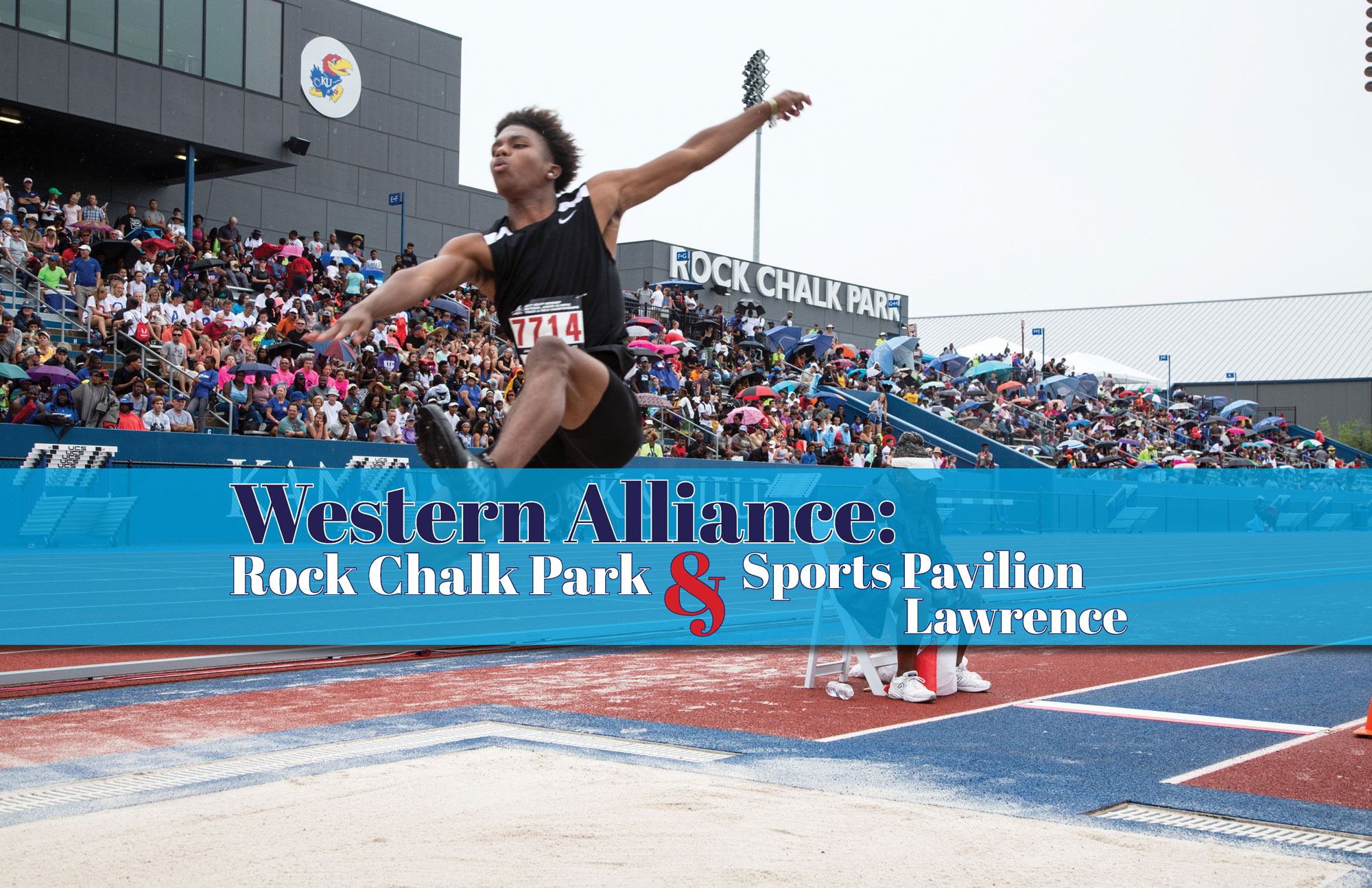
Western Alliance: Rock Chalk Park and Sports Pavilion Lawrence
When Rock Chalk Park opened in 2014, the University of Kansas (KU) Track and Field team was able to move off of an outdated track that had fallen into disrepair.
“We were probably one of two schools in the nation that had 440-yard tracks. That’s how outdated it was. And so, we were not able to host quality meets out there, because the requirement is having a 400-meter track,” says Stanley Redwine, the University’s track and field coach. “We practiced out there. We had to schedule our practices in the fall around football practices.”
And it wasn’t just track and field: Tennis, women’s soccer and softball all moved to brand-new spaces. With those new fields came the City’s Sports Pavilion Lawrence (SPL), a state-of-the-art recreation facility meant not just for the community to enjoy but also for Lawrence to attract conventions and tournaments.
And attract it did. Taylor Martin, the recreation facility operations supervisor, says the pavilion’s schedule is packed with tournaments, events and camps.
“I’ve got it up to about 50 events for next year. You’re looking at 18 volleyball tournaments [and]23 basketball tournaments,” Martin says. “We also worked with the University of Kansas as far as their volleyball and their Bill Self basketball camps each year, and then we have four craft fairs on the books and a pickleball tournament, as well. So we’re pretty much almost fully booked.”
It’s safe to say that Rock Chalk Park is a wild success, both economically and sportswise. But how did it get here?
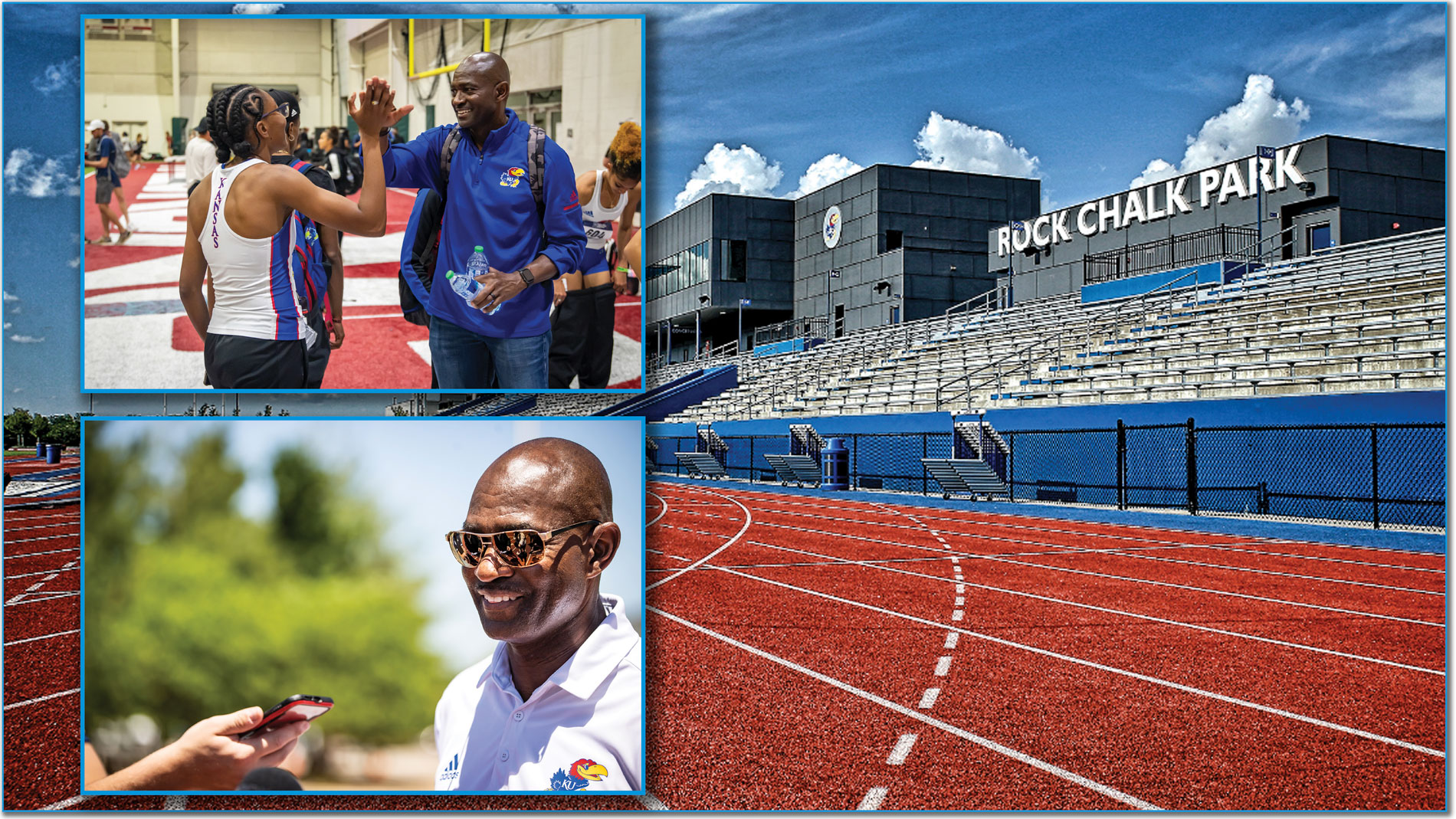
Head Coach Redwine high fives one of his student athletes and answers questions to a reporter
A New Beginning
Rock Chalk Park and Sports Pavilion Lawrence opened to the public at a reported cost of about $50 million. The difference between the two is important: One section is maintained in partnership with the University and KU Endowment, while the other section is completely maintained by the City of Lawrence.
“Rock Chalk Park was developed as a partnership between the various groups, but as far as the City of Lawrence Parks and Recreation, we manage the Sports Pavilion Lawrence, which is the facility in that park, as well as the tennis courts that sit right outside of it,” says Lindsay Hart, assistant director for Lawrence Parks and Recreation.
One of the big selling points of the complex at the time was that it would be free for all Douglas County residents to use.
“We want everybody to be able to go use the center,” City Manager David Corliss said at the time to city commissioners.
In that year’s State of the City, Mayor Mike Dever said Rock Chalk Park was part of a new era that would attract new jobs and businesses to Lawrence.
“As a commission, we’ve worked to build the infrastructure needed to take Lawrence to the next level in terms of economic development opportunities, and now it is time to deliver,” he explained.
Part of that was the ability to attract amateur sports events to the city, which in theory would have brought money in from outside of Lawrence. College sports teams, Amateur Athletic Union (AAU) tournaments and other sporting events were all believed to be the way forward for developing Lawrence.
Inviting Tournaments
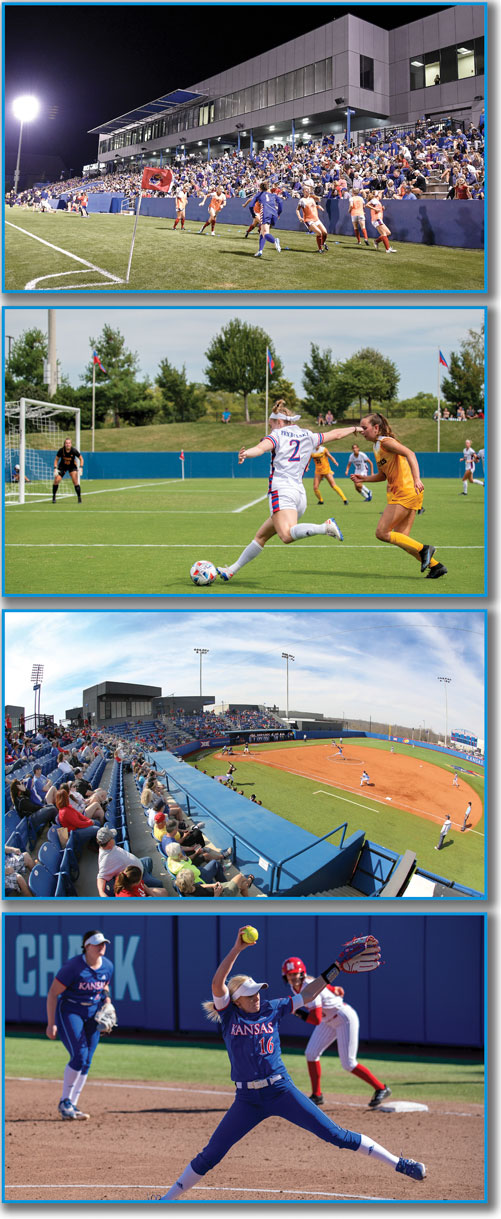
KU Women’s soccer and Softball games at Rock Chalk Park
Fast-forward eight years, and that vision seems to be coming true. The tournament schedule is full, and Hart says that despite the constant visitors, the pavilion has become a cultural center for Lawrence.
“It’s definitely a place where the community members…are feeling comfortable coming in and using it as their place to recreate,” Hart says. “We bring many visitors to town, which does have a positive impact on the community, as well. But we do a nice job of still providing space for the community to come in, use the cardio and the weights, and things like that, even when tournaments are going on. We really strive to continue to make it an easily accessible [and]friendly place for the community to come, as well as bringing in outside visitors for tournaments and big events.”
Part of the reason it’s become that cultural center is because Lawrence Parks and Recreation has carved out a specific space for residents with exercise machines and classes.
“I think community wellness is the reason we exist,” Hart says. “It’s why we offer all of our programming, all of our community centers, all these places for the community to recreate and be active. And so, we have done a great job of doing that not just at SPL but all over the city.”
As part of that mission, Martin says he is required to keep one court open for the community during events. However, he also says community members he’s spoken to don’t mind the constant events.
“We get a lot of positive responses. We get people that come out here and work out, and those that work out on the treadmills and watch an hour or two of great basketball,” he explains. “So we get a lot of positive responses, and you know, people come out here just in the community to watch the events, as well.”
The types of tournaments the pavilion hosts are vast. And the venue has been moving into bigger events, such as college-recruitment events and AAU tournaments. These events have been adding prestige to the building as a host, and Martin says he’s noticed an uptick in interested tournaments.
“I try to recruit tournaments that I see that are successful when other states are in the region. And I’ve noticed that I’m getting a lot more responses last year (than) I’ve got in the last few years,” Martin says. “I’ll get requests where I’ll have multiple requests for a weekend. So, I’ll have to sit down and figure out which one’s best for us at that time.”
KU’s Sports Empire
The new facilities have also enabled KU to host events separate from Lawrence Parks and Rec. In 2017, KU hosted the USA Track and Field National Junior Olympics at the track and field facility. Part of the reason KU was able to host what Redwine calls a “huge win” was because the track was an IAAF Class I Certified track.
That track has also enabled Redwine to conduct better practices, he says.
“I think what the new facility has done, it gives us a better opportunity,” he explains. “The surface in itself is a more advanced surface than it was at Memorial Stadium. So from that perspective alone, we’re healthier.”
The track, along with the new stadium and the upgraded facilities, have all been important when recruiting new athletes. Redwine says recruits are interested in everything the team can offer, including facilities.
“Recruits are not just interested in the academic part,” Redwine says. “They’re also interested in the bells and whistles of what a facility brings. And it allows us to show quality bells and whistles.”
One of the biggest differences in KU Track and Field’s new venue is the seating capacity. While Memorial Stadium has an official seat count of 47,000, Rock Chalk Park’s venue can only handle about 10,000 fans. Despite a 75% reduction in potential capacity, Redwine says he is fine with the audience arrangements.
“It just has a better cohesive atmosphere,” he says. “At Memorial Stadium, we’re hosting relays, and we were hosting meets. But that was a 55,000-seat stadium. And in having 10 to 15,000 people inside of a 55,000-seat stadium, it made it look quite empty. (At) Rock Chalk Park, if you have a 10,000-seat stadium, and you’re putting 10,000 people in a 10,000-seat stadium, it’s a sellout. And so more people want to come and be a part of that.”
Despite being close in proximity, KU rents out its facilities separately from the Sports Pavilion and the City of Lawrence. However, both University and City keep in close contact and help one another maintain fields and roads surrounding the facility. Redwine says the KU sports department maintains a close relationship with the City to make sure it is consistently attracting sports events.
“There has to be a collaboration between KU and the City of Lawrence,” he explains. “When I say we want to put those things out there, that’s just the initial part of it. Now our administration has to be in agreement with the City of Lawrence in order to make those things happen. There’s a sports commission in the City that will help on the bids and everything else. So just the total details of hosting a meet like that.”
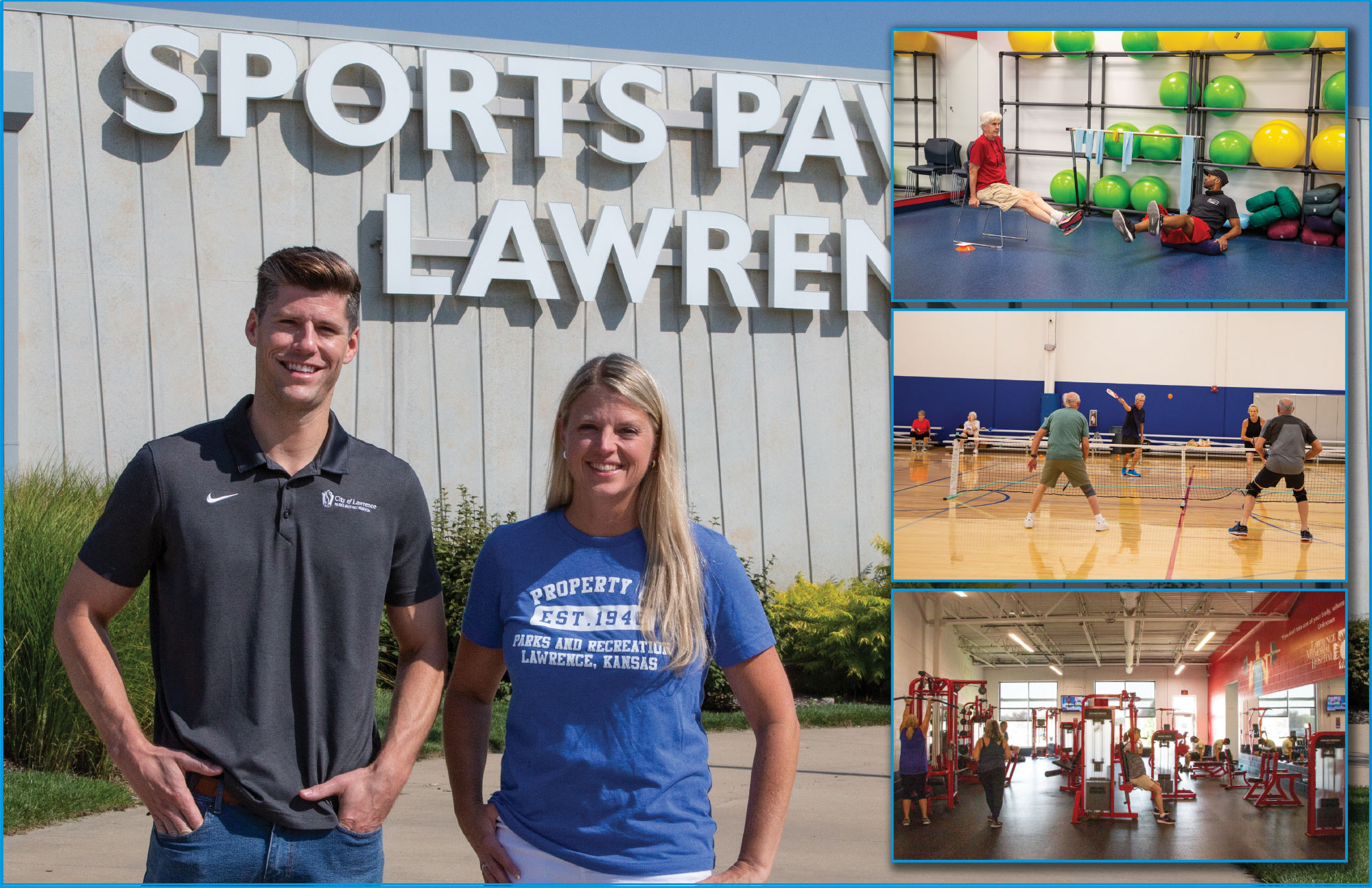
Taylor Martin and Lindsay Hart in front of SPL; an SPL trainer works with a client; pickleball and the weight room
The Economics of Tournaments
Much of the money the City of Lawrence and KU are able to make off of events is from rental fees. Although the amount of money from the facilities is not easily available, LPRD’s Martin says that rental fees aren’t the only way the City makes money.
“We also have a concessionaire inside our facility, where we take a portion of their revenue. And Sandbar Subs does a great job for us,” he adds. “During volleyball tournaments, they can bring in a pretty crazy amount of money, because these volleyball teams kind of just stay here all day. [They] have breakfast and lunch here, and then end up going out into the community for dinner at that time. So your revenue source [is]through rentals, through the tournament fees and … we get a little bit of that cut from the concessionaire, as well.”
The City of Lawrence is also able to gain money from these tournaments through taxes and economic development. Martin says between hotels, food and shopping, the economic impact to Lawrence is huge.
“I go out on the weekend, and I see Johnny’s West full of six volleyball teams. And when you’re talking volleyball teams, you’re talking 10 players plus parents plus siblings, maybe grandparents; so you’re looking at a pretty good bill once they go out for dinner,” he explains. “We worked with the hotels a lot during the pandemic to get things started again, and they’re pretty happy with the success and number of events that we’re hosting out here.”
Redwine says it’s a goal for him to start to get professional athletes on KU’s fields, something which is already happening. Sporting Kansas City II, a Major League Soccer Next Pro team, regularly holds its home games at Rock Chalk Park’s soccer field, already home to KU’s Women’s Soccer team.
“That’s a goal. And I think that’s an end goal, that it just depends on how much we can get accomplished between now and when it’s time to host a meet,” he adds.
Martin says that at the moment, the Sports Pavilion is just focusing on amateur and high school sports events. He says that part of his job, managing the NCAA calendar, brings certain challenges.
“To be honest, the NCAA recruiting calendar plays a large part in my job, as well. They seem to make changes late, and a lot of the tournaments that I host, basketball tournaments, out here need to have specific dates because of the recruiting calendar,” Martin says. “So when those changes happen with the NCAA recruiting calendar, that kind of puts a wrench in my thing, because then I have to try to please those tournament directors and make sure they have top talent coming here.”
It’s not hard to see the success of both KU’s new fields and the City of Lawrence’s facilities eight years on. As Hart says, it has always been about the community.
“We always like to just focus on the fact that we’re offering wellness for our community,” he explains. “… We’re pretty proud of what we’re able to offer.”
